
by Legalnaija | Nov 30, 2021 | Uncategorized
When the whistle is blown, and the ball is kicked, fans cheer and the stadium erupts with loud noises, as the games kicks on. The voices of your favourite commentators – Peter Drury, Sid Lowe, etc., serenade your mind. The matches are shown all around the world, and you have the opportunity to watch your favourite team live, and anywhere.
However, key to the transmission of these live matches is what is known as Broadcast Rights. This is when one party permits the other party (in this case a Broadcast channel, or medium) the right to broadcast its games. Broadcast rights is a huge means of income for football clubs, driving the interest in football to an increased level. In essence, complexities arise with broadcast rights matters as the major players will always want to protect their interest. Broadcast rights are usually sold by those who acquire the rights from the main owners, to other continental “retailers”. For example, the Premier League sold rights to BT Sports and SkySports to service the UK; whilst selling to SuperSport to serve Africa; and then to BeinSports to serve the Middle East.
2 types of Broadcast Rights
- Collective Rights
Collective broadcast rights are in situations whereby individual clubs allow a central body bargain, or negotiate broadcast right deals with broadcast companies. This system has been in place in the Premier League for many seasons. Thus, while clubs own their individual broadcast rights, the Premier League, negotiates with broadcast companies on their behalf, in a bid to strike favourable agreements.
Currently, the Premier League has its domestic rights being shared amongst Sky and BT (both of whom are its major broadcasters), as well as Amazon (although the number of matches available are limited).
Amongst the reasons why clubs would opt for the Collective rights include:
- It increases the league’s (and to a very large extent, the clubs’) bargaining power, especially when the league is well watched and has huge following.
- Clubs do not have to go through the stress of individually negotiating with broadcasters.
- The sharing formula tends to be equal, as the level of disparities in terms of payment is not usually wide.
On the other hand, clubs would be reluctant to embrace the collective rights because:
- It reduces the chances of them making enough money – especially the top clubs whose games will be top of the pile for broadcasters.
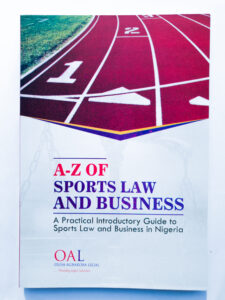
ORDER NOW www.legalnaija.com/shop
- Individual Rights
Individual broadcast rights are usually seen in situations when clubs directly negotiate with the broadcast channels. This mode used to be in operation in Spain, as Barcelona and Real Madrid enjoyed a lot of income from broadcast revenue. It was stated that when Athletico Madrid won the Spanish la liga in 2014, relegated Premier League side, Cardiff City, made more money than the then Spanish champions.
This however has changed, with the la Liga now accepting the collective broadcast mode, allowing the parent spread across all clubs.
Clubs would be open to the individual rights because:
- They would be able to negotiate by themselves and would only focus on their own interests;
- The more of their matches that get shown by the broadcasters, the more money they make.
On the other hand, the reluctance of the clubs would be:
- Due to the fact that “smaller” clubs cannot negotiate properly, as well as earn as much as top clubs.
- The level of disparity in terms of payments usually are quite huge, leaving lower clubs at a disadvantage.
Broadcast Rights in the Premier League.
The Premier League is described as the most watched league in the world, with its reach spreading far across the world. Thus, the premier league has been able to leverage on this fact to its advantage, thereby having potential rights buyers pay a lot of money to secure these rights.
What is more interesting is the fact that the BBC, over a period of three years (2016-19), paid over 150 million pounds to broadcast highlights of Premier League matches. While international rights for highlights of matches stood at over 2 billion pounds. It is therefore not difficult to understand why Premier League owners are either unwilling to sell their clubs (or majority stake in those clubs), or sack managers who are unable to deliver results.
With the current sharing formula, relegated teams gain excess millions of pounds per season (with 25% of the total payment based on how many of their games are shown live).
It must be noted however that the Covid-19 pandemic brought about what would possibly be described as an “innovation” due to the fact that the Premier League did not want fans at the stadium. Thus it was decided that Premier League games would be spread across various days, as well as making sure there were no simultaneous fixtures. This is a shift from what used to be the norm – with 3 o’clock Saturday fixtures not being shown on TV.
In the Premier League, the distribution model of the monies from broadcast rights includes:
- 50% of UK broadcast revenue is split equally amongst the 20 clubs;
- 25% of the UK broadcast revenue is paid in Merit Payments. This means that payment is dependent on where the clubs finish when the league ends.
- 25% of the UK broadcast revenue is paid in facility fees. This means the payment is dependent on how many times a club’s matches are broadcast in the UK.
- While all international broadcast revenue and central commercial revenue is split equally amongst the 20 clubs.
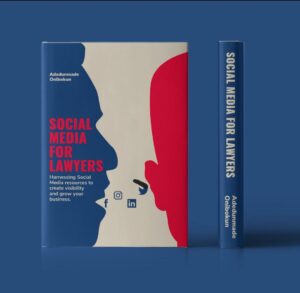
ORDER www.legalnaija.com/shop
Application of Broadcast Right to Nigeria
In a bid to understand whether the Nigeria Professional Football League (NPFL) makes use of the collective of individual rights, it will be essential to make examine the league’s regulation. Thus, Article 7.1 of the NPFL Rules and Framework states that:
“The LMC shall enter into Commercial Contracts, Broadcasting Contracts and Title Sponsorship Contracts with the intention in the case of each Broadcasting Contract for the live Transmission of League Matches that each Club shall participate in at least one live televised League Match each Season.”
From the above, for broadcast rights to be sold or bought or agreed on, there must be a contractual agreement between both parties. Thus, any broadcast of an NPFL match without the due authorization will be a breach of the NPFL’s copyright as it was not authorized. In other words, the NPFL makes use of the Collective Rights, as the LMC bargains and negotiates with broadcast partners on behalf of the clubs.
Importance of Broadcast revenue
The royalties that broadcasters earn from selling their exclusive footage to other media outlets enable them to invest in the costly organizational and technical infrastructure involved in broadcasting sports events to millions of fans all over the world.
Broadcasters’ rights provide the following options:
- safeguard costly investments in televising sporting events
- recognize and reward the entrepreneurial efforts of broadcasting organizations
- recognize and reward their contribution to diffusion of information and culture
Essentially, broadcast right play and essential part in football, as clubs are able to maximize one the ways they make revenue, and can also protect their interests.
 Ayomide Eribake is a graduate of law (Second Class Upper Division) from the University of Lagos. Over the last few years, he has developed keen interest in Sports Law, researching and writing on a number of sports law issues which have been published both online and in print.
Ayomide Eribake is a graduate of law (Second Class Upper Division) from the University of Lagos. Over the last few years, he has developed keen interest in Sports Law, researching and writing on a number of sports law issues which have been published both online and in print.
He has garnered experience in Sports Law, working as a Legal Assistant at Sportlicitors LP, a Sports Law firm in Nigeria. During his time at the firm, he assisted with research, contract reviews and other tasks. He was also involved in creating the firm’s Virtual Internship scheme for law students – which also involved students from foreign countries.
Amongst his legal interests include: Football law, E-Sports, Insurance law and Labour law. During his free time, he enjoys reading, writing, playing football manager and watching football. He’s also a huge Liverpool fan.
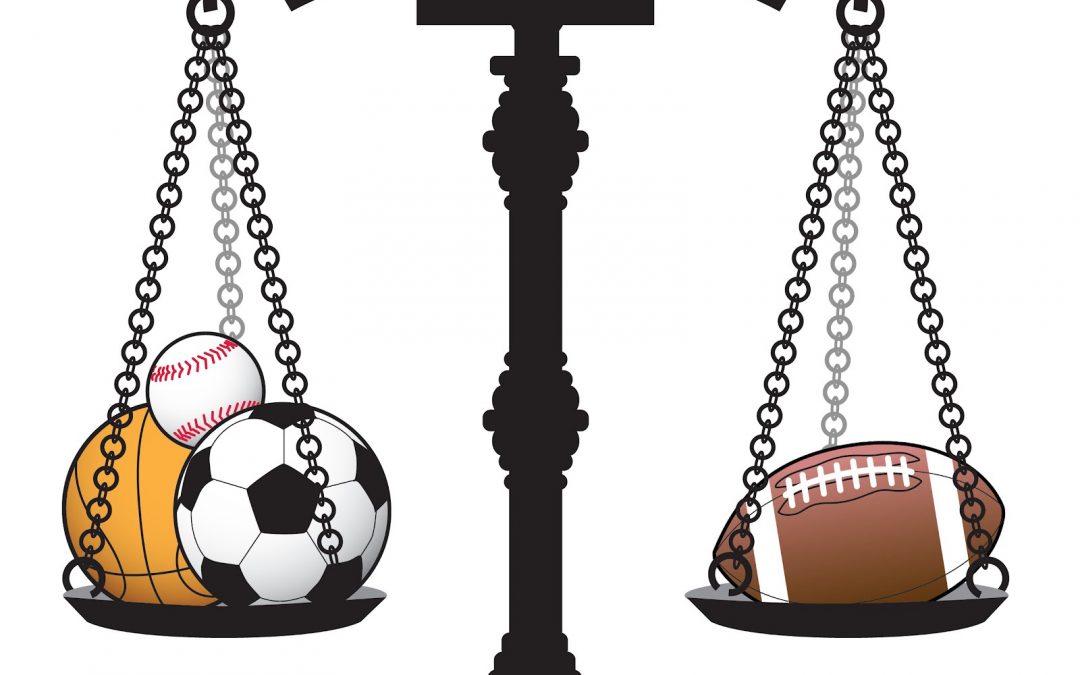
by Legalnaija | Nov 30, 2021 | Uncategorized
The recent managerial sackings and appointments in the Premier League, and across board has had an erstwhile domino effect – with no Norwich City manager, Dean Smith, being appointed weeks after being sacked by Aston Villa; and Rangers having to hire former player, Gio Van Bronckhurst, after former manager, Steven Gerrard, was hired by Aston Villa. However, these terminations and appointments are protected by a new guideline established by football governing body, FIFA.
On December 14, 2020, FIFA announced new changes to the Regulation on the Status and Transfer of Players (RSTP), creating a new regulatory framework for coaches. The new amendment was a welcome development as there wasn’t any regulation governing the contracts of coaches. Thus, just like football players, whose contracts are protected by the Regulation on the Status and Transfer of Players, the contracts of managers have now been protected under the new RSTP. This article seeks to give an overview on the Amendments made to the RSTP as regards the regulatory framework for coaches.
Application of the Annexe
To begin with, Annexe 8 of the RSTP provides the essentials regarding the rules for the employment of coaches. The rule applies to two sets of coaches:
- Those who are paid more than their expenses they incur during their coaching activity; as well as
- Those under the employment of professional clubs and associations.
This means that in a situation where the coach doesn’t get paid more than the expenses they incur, and they aren’t employed by professional clubs and associations, the Rule will not apply to them. Thus, the distinction is similar to that between amateur and professional players, with the difference being the groups.
Validity of Contract
To have a valid professional contract, a number of criteria must be met. Article 2 provides that the contract must be in writing. Additionally, the contract must contain the essential elements of an employment contract (essentialia negotti) which include – the object of the contract, the rights and obligations of the parties, the status and occupation of the parties, the agreed remuneration (which includes bonuses as well – this could include bonuses if the cub achieves any huge feat such as winning a title, avoiding relegation, etc. for example, Westbromich Albion manager, Sam Allardyce, was said to have a seven figure bonus in his contract should the club avoid getting relegated in the 2020/2021 Premier League season). It is also important to note that where an intermediary is involved in the contract negotiation, their names must be in the contract.
Further, the contract is valid, subject to work or residence permit being granted; the coach having a specific coaching licence; as well as requirements of an administrative or regulatory nature.
Termination of contracts
Termination of contracts is an important part of contractual relationships between football clubs and coaches. Thus, Article 3 of the Annexe states that the contracts can only be terminated either by expiration or by mutual agreement.
In December 2020, the FIFA Dispute Resolution Chamber found Australian club, Brisbane Roar, guilty of wrongfully terminating the contract of former manager, Robbie Fowler. Fowler’s contract was terminated after the club stated that his comments made against the club ruined its reputation globally. The Chamber held that the club had to pay Robbie Fowler and his assistant, Tony Grant, three months of their wages, which was before they were hired by an Indian Super League club.
It is important to note that before the new Annexe, the termination of contracts of managers didn’t have a lot of rules. However, managers usually had agreements with clubs and got pay-outs whenever they were sacked by their former clubs. For example, when Jose Mourinho was sacked by both Manchester United and Chelsea, he received huge pay-outs from both clubs. Also, former Everton and Newcastle United manager, Sam Allardyce also received pay-outs when his contracts were terminated by clubs.
Termination of contract with Just Cause
Article 5 of the Annexe provides for termination of contracts where there is just cause. “Just cause” in this situation applies to situations of outstanding contracts. It states that where a club fails to pay the coach’s salary for at least two months on their due dates, the contract will be deemed to have been terminated, as long as the coach has made the club or association aware of the situation in writing, as well as granting at least a 15-day deadline to fulfil its financial obligations.
Termination of Contract without Just Cause
According to Article 6 of the Annexe, in all cases, compensation shall be paid by the party that has breached the contract. In terms of calculation of the compensation, it will be calculated thus:
The Coach’s Compensation
- Where a coach hasn’t signed a new contract and his contract is terminated, the compensation will be equal to the value of the contract that was terminated. For example, where the coach signed a two-year contract, and gets sacked with six months of his contract left, the value of compensation will the value of the six months left.
- Where the coach has signed a new contract by the time the decision to terminate the contract has been taken, the value of the new contract which corresponds with the time remaining on the contract that was prematurely terminated shall be deducted from the residual value of the contract that was terminated early – this is called Mitigated Compensation.
Compensation due to the Cub or Association
- The compensation will be calculated based on the damages and expenses the club or association incurred in connection with the contract termination. Due consideration will be given to the remaining remuneration and salary benefits the coach was due under the contract that was prematurely terminated – which includes the fees and expenses which the former club incurred.
In conclusion, the regulation provided a framework governing the contracts of football coaches, thereby giving them proper protection, and making sure their rights are better protected. Unlike the days before the creation of the regulation, the regulation makes sure to cover the field in terms of the validity of contracts, as well as termination of contracts. The only spanner in the works that might appear will be the fact that this regulation cannot be enforced by local coaches in Nigeria –due to the fact that should disputes arise, they have to be international in nature for FIFA to have Jurisdiction, and the NFF is yet to constitute a National Dispute Resolution Chamber (NDRC).
 Ayomide Eribake is a graduate of law (Second Class Upper Division) from the University of Lagos. Over the last few years, he has developed keen interest in Sports Law, researching and writing on a number of sports law issues which have been published both online and in print.
Ayomide Eribake is a graduate of law (Second Class Upper Division) from the University of Lagos. Over the last few years, he has developed keen interest in Sports Law, researching and writing on a number of sports law issues which have been published both online and in print.
He has garnered experience in Sports Law, working as a Legal Assistant at Sportlicitors LP, a Sports Law firm in Nigeria. During his time at the firm, he assisted with research, contract reviews and other tasks. He was also involved in creating the firm’s Virtual Internship scheme for law students – which also involved students from foreign countries.
Amongst his legal interests include: Football law, E-Sports, Insurance law and Labour law. During his free time, he enjoys reading, writing, playing football manager and watching football. He’s also a huge Liverpool fan.

by Legalnaija | Nov 9, 2021 | Uncategorized
Are you a lawyer practicing in Lagos?
Will you like to be the best lawyer in the room?
If your answer to both questions is YES, then this opportunity is just for YOU, yes YOU.
It is trite that no lawyer can know all the laws, but all lawyers must know where to find the law. You will also agree that a good law library is an invaluable asset to your practice and can be what allows you deliver to clients faster while gaining their trust and earning you a bigger professional fee.
Because we are rooting for you, we are offering FREE DELIVERY on all orders to lawyers in Lagos.
On the Legalnaija online bookstore, we have books that will be of immense value to your practice. Some of our highly recommended publications include;
- The Nigerian Electricity Market; Understanding The Transactional, Legal & Policy Issuesby Dr. Ayodele Oni (₦35,000)
- Understanding Petroleum (Oil & Gas) Transactions and the Nigerian Market(₦50,000)
- A – Z Of Sports Law(₦2,500) by Olisa Agbakoba Legal
- A Force of Justice (A collection of law articles published in honour of Hon. Justice Oguntade JSC Rtd)(₦25,000)
- Babalola’s Law Dictionary Of Judicially Defined Words And Phrases (2nd Edition)by Olumide Babalola (₦5,000)
- Casebook On Data Protectionby Olumide Babalola (₦20,000)
- Casebook On Human Rights Litigation In Nigeriaby Frank Agbedo (₦20,000)
- Dark Hearts (Hard Cover)by Layi Babatunde SAN (₦4,500)
- Human Rights Litigation In Nigeria: Law, Practice And Procedureby Frank Agbedo (₦8,000)
- International Arbitration Law And Practice: The Practitioners Perspectiveby Tolu Aderemi (₦10,000)
- Journal Of Current Law And Arbitration Practice (Vol 1, No.2) (₦5,000)
- New Developments In Law And Practice In Nigeria(Essays In Honour Of Dele Adesina SAN) (₦20,000)
- Rights Of Suspects And Accused Persons Under Nigerian Criminal Lawby Frank Agbedo (₦6000)
- Social Media For Lawyersby Adedunmade Onibokun (₦2,500)
- The Employment Law Handbookby Jamiu Akolade (₦15,000)
- Entertainment Law in Nigeria (N25,000)
- The Lawyers companion by Layi Babatunde SAN (N15,000)
- A Hand Book Of Criminal Law And Procedure Through Cases (Hard Cover) by Layi Babatunde SAN (₦10000)
- Hints On Land Documentation And Litigation In Nigeria (Paper Back) by Layi Babatunde SAN (₦9000)
- Principles Of Clinical Ethics And Their Legal Dimensions In Nigeria (Paper Back) by Layi Babatunde SAN (₦5000)
Please note you can order any of the afore listed publications by;
- Visiting the online bookstore on www. legalnaija.com/shop
- Make a direct order by contacting a Sales Representative on 09029755663.
Kindly note all books are delivered to your door step by our trusted courier partners within 3 days. We look forward to helping you build your legal practice, equip your law library and achieving success.
Thank you.
Legalnaija Team
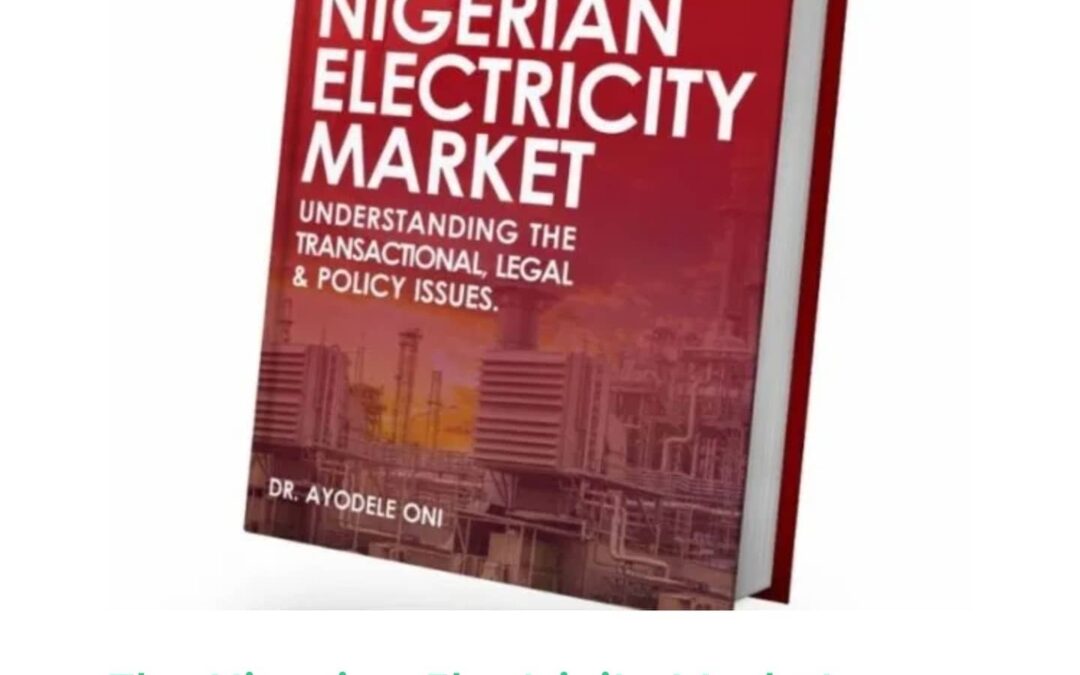
by Legalnaija | Oct 22, 2021 | Uncategorized

The Legalnaija online bookstore is offering mouth watery deals on law books for the duration of the NBA Conference. The online bookstore is the first of its kind dedicated to the legal profession, and it curates some of the most recent publications on diverse areas of law and jurisprudence.
Some of the highly recommended publications on the online bookstore include;
- The Nigerian Electricity Market; Understanding The Transactional, Legal & Policy Issues by Dr. Ayodele Oni
- Understanding Petroleum (Oil & Gas) Transactions and the Nigerian Market
- A – Z Of Sports Law by Olisa Agbakoba Legal

- A Force of Justice (A collection of law articles published in honour of Hon. Justice Oguntade JSC Rtd)
- Babalola’s Law Dictionary Of Judicially Defined Words And Phrases (2nd Edition) by Olumide Babalola
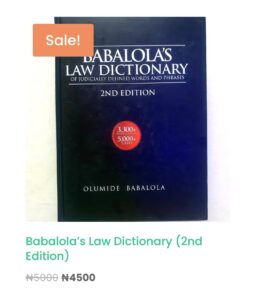
ORDER NOW
- Casebook On Data Protection by Olumide Babalola
- Casebook On Human Rights Litigation In Nigeria by Frank Agbedo
- Dark Hearts (Hard Cover) by Layi Babatunde SAN
- Human Rights Litigation In Nigeria: Law, Practice And Procedure by Frank Agbedo
- International Arbitration Law And Practice: The Practitioners Perspective by Tolu Aderemi
- Journal Of Current Law And Arbitration Practice (Vol 1, No.2)
- New Developments In Law And Practice In Nigeria (Essays In Honour Of Dele Adesina SAN)
- Rights Of Suspects And Accused Persons Under Nigerian Criminal Law by Frank Agbedo
- Social Media For Lawyers by Adedunmade Onibokun
- The Employment Law Handbook by Jamiu Akolade
- Entertainment Law in Nigeria
- The Lawyers companion by Layi Babatunde SAN
- A Hand Book Of Criminal Law And Procedure Through Cases (Hard Cover) by Layi Babatunde SAN
- Hints On Land Documentation And Litigation In Nigeria (Paper Back) by Layi Babatunde SAN
- Principles Of Clinical Ethics And Their Legal Dimensions In Nigeria (Paper Back) by Layi Babatunde SAN
Please note you can order any of the afore listed publications for local or international delivery through any of the following ways;
- Visit the online bookstore on legalnaija.com/shop
- Make payment to Lawlexis International / Fidelity Bank / 4011176564 and forward the name, number, address of recipient and proof of payment.
- Pay on delivery (Available in Lagos Only***)
You may also contact us via email on hello@legalnaija.com, or via 09029755663. Legalnaija adheres to the strictest rules of professionalism and ethical conduct so you are sure to get great customer service, timely delivery and law books to boost your practice.
Dear Learned Friend,
We know your goal is to achieve success in your career by attracting clients who value your skills and are willing to pay your professional fees. We also know you are actively searching for avenues to make such connections.
Taking the step to begin your subscription process to the Legalnaija Lawyers Directory was the right decision and we believe completing the process will open you to the success you desire.
All you have to do is complete the verification process to the Directory by;
- Completing your profile, and
- Attaching your call to bar certificate and practicing fee receipt.
There are hundreds of clients looking for skilled legal practitioners on the Legalnaija Lawyers Directory and they are filtering their search by location and/or the area of law they require legal services for.
We want to suggest you take the weekend and the time off work to complete work on your goals, complete the subscription and ensure either you or your law firm are listed on the Directory.
The subscription plans are quite affordable but no need for that now, why not take the 30 day free trial and be on your way to achieving success in your legal career. After your free trial you can choose to continue your subscription or not.
You have nothing to lose by focusing on your goals, so log on to the Directory and complete your verification now.
If you need any assistance, please call or WhatsApp 09029755663. You may also reach us via email at hello@legalnaija.com or by simply replying to this email.
You can thank us later.
The Legalnaija Team
www.legalnaija.com

by Legalnaija | Oct 21, 2021 | Uncategorized
Gender balance means human resources and equal participation of women and men in all areas of work, projects or programmes.
According to Bloomberg, recent research from the World Economic Forum indicates it will take 202 years for women to achieve economic gender parity. Despite progress and positive trends overall, the gap in economic opportunity between genders remains the disparity that will take the longest to close completely.

ORDER NOW
For lawyers in Nigeria, this is a big issue and always been the topic in different legal fora, especially by Nigerian lawyers, and even non-lawyers as well. Likewise this is going to be a huge topic at the upcoming NBA Conference starting on Friday, 22nd October, 2021.
All lawyers are allowed to encouraged to participate in the session on Tuesday, 26th October, 2021.

by Legalnaija | Oct 20, 2021 | Uncategorized
According to a Harvard paper, dispute resolution is the process of resolving a dispute or a conflict by meeting at least some of each side’s needs and addressing their interests. Dispute resolution strategies include fostering a rapport, considering interests and values separately, appealing to overarching values, and indirect confrontation.
In the 2018 Justice Needs and Satisfaction Survey in Nigeria conducted by the Hiil, about 25 million disputes arise in Nigeria every year. Also men encounter legal problems more often than women, which they pegged at a 74% to 71% ration. Also, people in the highest income group encounter legal problems more often than others, particularly the lowest income group.

BUY NOW
However, are all these legal problems resolved? What is the impression of the average Nigerian to the dispute resolution mechanisms available. Are the Courts adequate? What role is ADR playing in all this and how can we ensure more user friendly justice systems in Nigeria?
All these and much more will be discussed at a session of the Annual General Conference of the Nigeria Bar Association. The session promises to be quite engaging and participants are encouraged to actively take part in the session.
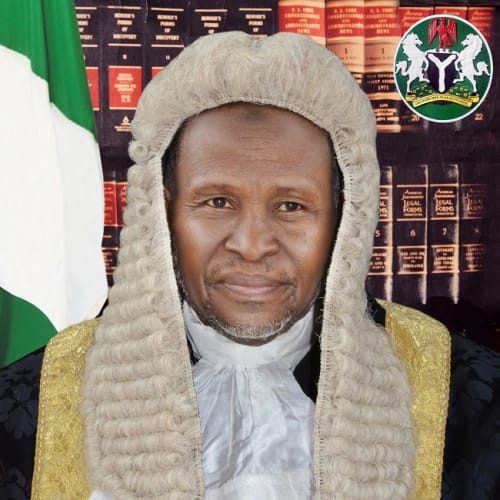
by Legalnaija | Oct 20, 2021 | Uncategorized
Following a wave of conflicting court orders in the country recently, the Chief Justice of Nigeria (CJN), Hon. Justice Tanko Muhammad, demanded the records of proceedings in the suits. The development is sequel to the recent ex-parte decisions delivered by High Courts in three different states (River, Kebbi and Cross River) all of which border on the suspension or otherwise of the Chairman of the Peoples Democratic Party (PDP), Mr. Uche Secondus, which again brought to the fore the nuisance of conflicting judgments by courts of coordinate jurisdiction, particularly on pre-election, post-election and political party leadership crisis.
According to the Guardian Newspapers, the NJC, saddled with the responsibility of upholding decency and discipline by judicial officers, needs to act fast, starting with full investigation of the three judges being referred to it, in order to salvage the battered image of the Judiciary. This ugly trend negates all known and acceptable laid down judicial principles, one of which forbids the further litigation of a subject matter involving the same parties and of the same issues.
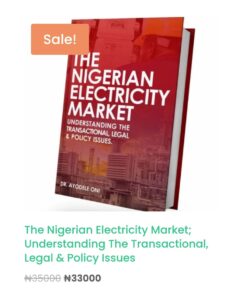
ORDER NOW
Legal practitioners, being officers of the court, should be reminded of the nobility associated with the profession and conduct themselves in a manner characterized by candour and fairness. They should be reminded that a client has no right to demand that his lawyer do or refrain from doing anything repugnant to his lawyer’s sense of honour or propriety; and he is obliged to decline the conduct of a civil cause or to make a defence when convinced that it is intended merely to harass or injure the opposite party or to occasion a miscarriage of justice.
No doubt this was a very embarrassing moment for the Judiciary, and that’s why its important Lawyers thrash it out at the upcoming conference which starts on the 25th of October, 2021. Most certainly eminent members of the Bar and Bench will be on hand to contribute to the discussions. Save the date and time and make sure you participate.
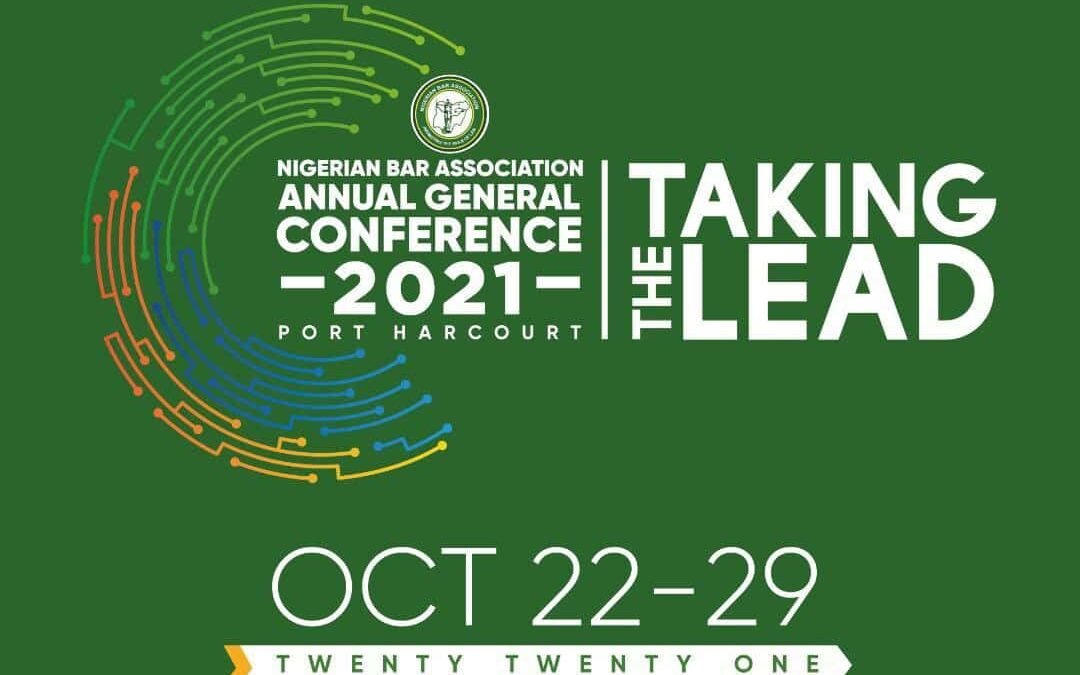
by Legalnaija | Oct 20, 2021 | Uncategorized
There are 5 main factors that affect economic growth and development, they include;
(a) Human Resource:
(b) Natural Resources:
(c) Capital Formation:
(d) Technological Development:
(e) Social and Political Factors
According to ThristlePraxis “Economic growth is an expansion in a country’s economy or an increase in productive capacity. It creates virtuous circles of human and nation development, evident in improved quality of lives of the people. Economic growth is a fundamental requisite to eradicating poverty, reducing inequality, ensuring sound healthcare, creating opportunities for quality education for all, building sustainable cities and communities, and attaining just any form of development needed for transiting from a developing economy to a developed one.”

ORDER NOW
Looking at the above mentioned paragraph, and connecting it with the earlier mentioned 5 factors that promote or affect the economic growth and development of a nation, we must ask ourselves how well we are utilizing the resources available to us.
During the Annual General Conference of the AGC, members of the bar and other distinguished guests will be discussing this topic, as its one of the sessions scheduled to hold during the conference which kicks off on the 25th of October, 2021. It’s going to be a very engaging session so members are encouraged to attend the session and participate.

by Legalnaija | Oct 20, 2021 | Uncategorized
The Federal Competition and Consumer Protection Commission (FCCPC) is the foremost competition and consumer protection authority in Nigeria.
The Commission was established by the Federal Competition and Consumer Protection Act (FCCPA) 2018 to, among others, develop and promote fair, efficient and competitive markets in the Nigerian economy, facilitate access by all citizens to safe products, and secure the protection of rights for all consumers in Nigeria.
The Commission in fulfilment of its statutory mandate deploys several regulatory tools to monitor and modify behaviour of service providers and manufacturers. Some key areas of operation include complaint resolution, surveillance and enforcement, consumer education, as well as research and strategy.
- Complaint Resolution
- Surveillance & Enforcement
- Quality Assurance & Development
- Consumer Education
- Research & Strategy

ORDER NOW
The Commission engages in domestic and global research on products and services, as well as changing or evolving market trends and consumer behaviour. Research and strategy play a pivotal role in how the Commission accomplishes its mandate and allocates its limited resources.
During the Annual General Conference of the Nigerian Bar Association, this topic will be discussed at one of the sessions on the 25th of October, 2021, do ensure you participate either in person or online.

by Legalnaija | Oct 20, 2021 | Uncategorized
The government needs to declare a state of emergency on what has now become a destitute orientation/mentality of her citizens. The National Orientation Agency needs to be revitalized and gets her tooth re-sharpened, and be swung into full action. The draft/template that has been designed to shape our orientation needs to be revisited and perhaps redesigned.
“Sixty years of nationhood provides an opportunity to ask ourselves question on the extent to which we have sustained the aspirations of our founding fathers. Where did we do the right things? Are we on course? If not where did we stray and how can we remedy and retrace our steps?”
These were the candid words of President Muhammadu Buhari in his speech marking the nation’s 60th anniversary. These words obviously speak to our collective essence, a crucial concern, I believe, we need to consider and reconsider, in tandem with our burning desire to attain our deserved greatness.
- Noah Dallaji, Founder, African Children Talent Discovery Foundation

CLICK TO ORDER
From the above quotes you will agree that this session of the Nigeria Bar Association’s 61st Conference will be thought provoking and quite engaging. Join world leaders, political icons, judges, leading lawyers, thought leaders, policy makers, business icons, civil society and lawyers as the topic; Reversing The Trend – A Call For National Re-Orientation, is discussed on the 25th of October, 2021, at the NBA Conference. All lawyers are encouraged to participate either in person or online.



 Ayomide Eribake is a graduate of law (Second Class Upper Division) from the University of Lagos. Over the last few years, he has developed keen interest in Sports Law, researching and writing on a number of sports law issues which have been published both online and in print.
Ayomide Eribake is a graduate of law (Second Class Upper Division) from the University of Lagos. Over the last few years, he has developed keen interest in Sports Law, researching and writing on a number of sports law issues which have been published both online and in print. 












